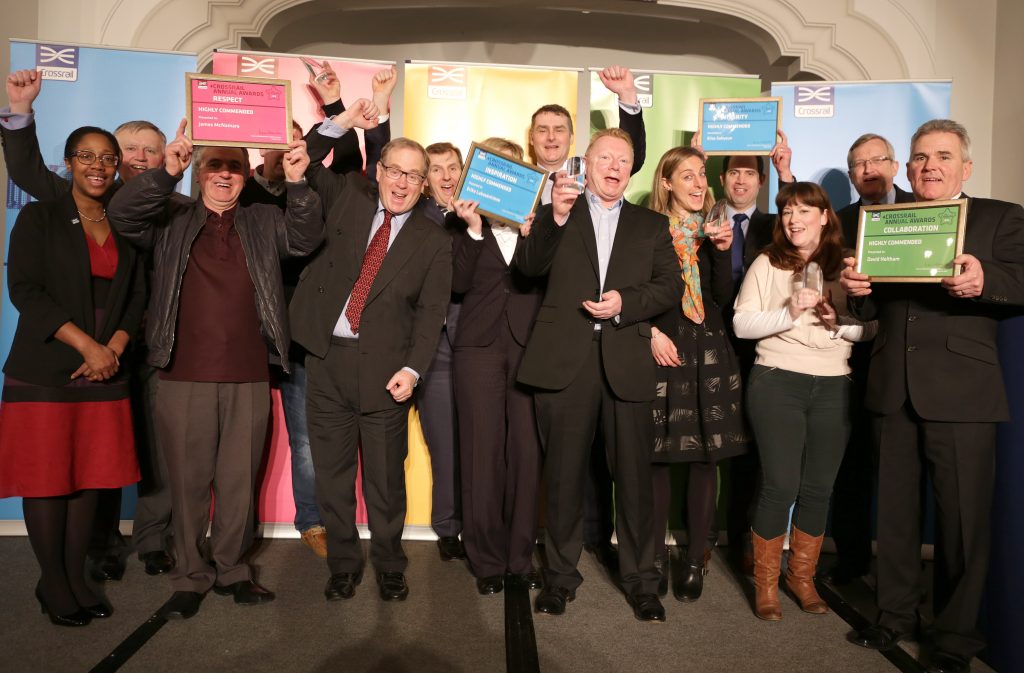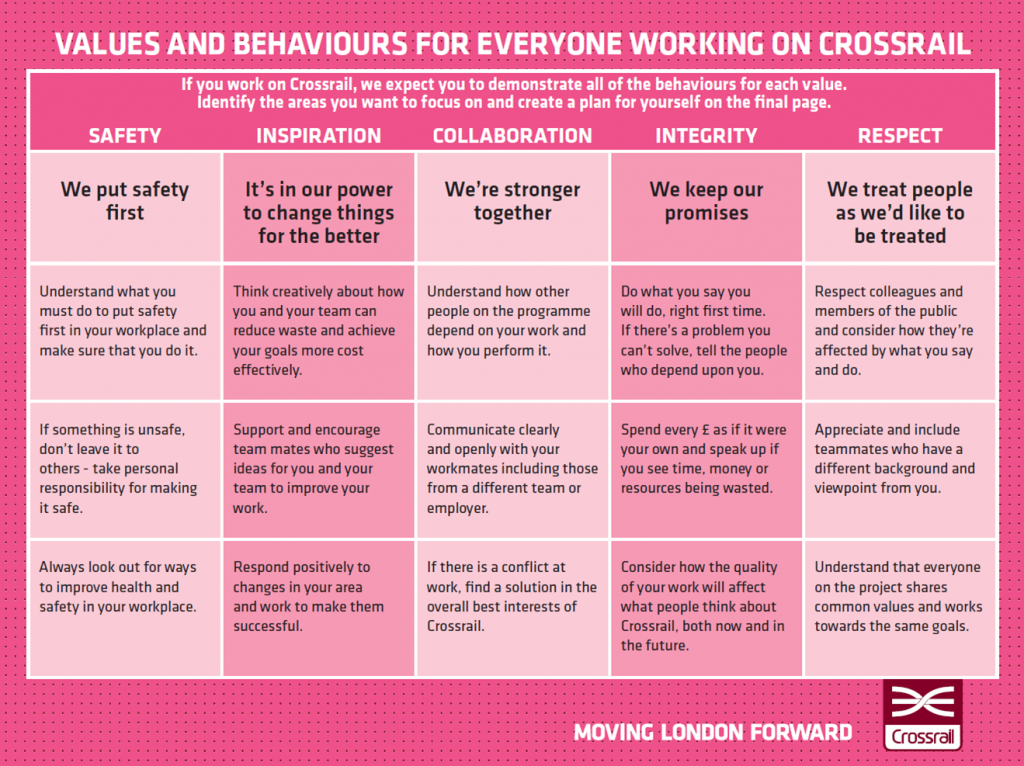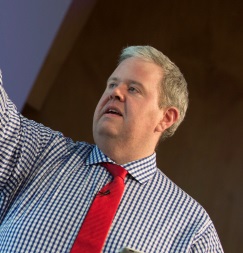
Vision, Mission & Values
Document
type: Micro-report
Author:
Rob Jones, Richard Davies
Publication
Date: 27/09/2016
-
Abstract
This micro-report sets out Crossrail’s lessons learned from creating and launching a new vision, mission and values across an integrated team and bringing them to life. The micro report concludes the importance of ensuring that there is sufficient time to consult with staff before developing and launching a new vision, mission and values; and the importance of ensuring that there is sufficient buy-in from the leadership team.
This micro-report will be of interest to individuals who seek to embed a new vision, mission and values within an organisation such as the senior leadership team and organisational development practitioners.
-
Read the full document
Introduction
In 2012, with the formation of the integrated team and the arrival of a new Chief Executive Officer, Crossrail embarked on creating a new vision, mission and set of values for the programme. The leadership team set out to create a new, unified culture, based on a shared vision, mission and values. The aim was for everyone who worked on Crossrail, regardless of employer, to feel part of something special, summarised in the following statement:
“Whatever role we do, wherever we work, whoever we work for, we are all part of the same project, sharing common values and working towards the same goals.”
For Crossrail, this was no straightforward exercise. The core ‘client’ delivery organisation comprised of 1,200 people from nine different employers, integrated into a single ‘Team Crossrail’. Its role was to oversee delivery from 20 principal contractors, each with their own supply chain – a peak workforce of 14,000. This diverse team ranged from technical office roles to site construction roles, geographically dispersed across more than 40 separate projects. Some of the principal contractors operated in a joint venture environment and brought vision, mission and values from their home organisations. Taking into account that the staff of some contractors also had limited access to technology because of the nature of their role, developing and rolling out a common vision, mission and values was challenging.
With support from the Organisational Effectiveness (OE) team, the Crossrail Executive and Investment Committee defined an inspirational new vision, mission and values, which were shaped though consultation with Crossrail staff:
- Crossrail’s vision: ‘Moving London Forward’.
- Crossrail’s mission: ‘Delivering a world class railway that will fast track the progress of London’
- Crossrail’s values: Safety, Inspiration, Collaboration, Integrity and Respect
The vision and mission represented Crossrail’s wider ambition: Crossrail was building ‘more than a railway’. It was also creating a sustainable legacy for business, communities, the environment and the industry, while providing skills and employment opportunities for a new generation. The values stated how Team Crossrail would work together to deliver this vision.
What Crossrail Did
Roadshow
The OE team organised a roadshow for senior leadership to engage team members about the new thinking. This was a valuable exercise to demonstrate leadership commitment and receive feedback. One view expressed was that ‘Moving London Forward’ sounded ‘a bit arrogant’: could Crossrail really make that much of a difference? It provoked a useful debate about the need to inspire people that this really was a ‘once in a generation’ opportunity to deliver transformational change.
The annual employee engagement survey, Big Dig, demonstrated an immediate understanding and acceptance of the new direction for Crossrail.
From 2013 onwards, the OE team worked to bring the vision, mission and values to life:
‘The Little Pink Book’ and Supporting Material
A handy pocket-sized guide (‘the little pink book’) was developed that set out what you could expect and what was expected of you when working on Crossrail, with a clear message to hold each other to account for living the values. Every team member receives their own copy to personalise and keep handy. A variety of media – posters, notebooks, intranet banners – were developed to remind people of the Crossrail values every day.
Figure 1 – Crossrail’s ‘Little Pink Book’
Induction
All new starters attend induction on their first day, which outlines the Crossrail vision, mission and values. Depending on an individual’s role and their working location, they either attend a head office induction or the programme wide induction and site induction.
Staff attending the head office induction receive a copy of the ‘little pink book’ and meet a senior leader who emphasises the importance of the Crossrail values.To ensure that individuals working on site were aware of Crossrail’s vision, mission and values, these were imbedded in the programme wide and site inductions with Tier 1 contractors and were cascaded through their supply chains. The format and how this was done was up to the individual contractors.
Values awards and Values Champions
A Values Award programme was developed to celebrate team members (including contractors) who are role models in living the Crossrail values and of the behaviours expected. A network of Values Champions was recruited to help manage Values Awards and promote it locally. Each directorate and project team selects a monthly award winner for safety and a further award for one of the other four values. These monthly award winners are then invited to quarterly area award events and ultimately an annual Crossrail-wide event. Although the prizes are modest (certificates, badges, fleeces), the recognition from peers, line managers, the Executive Committee and the Chief Executive Officer is highly motivational, resulting in the awards programme becoming genuinely owned by the organisation. More than 400 team members receive awards every year.
Figure 2 – Crossrail Values Awards
A further benefit was that the nominations provided an indicator of how well people understand individual values. For example, low nominations for ‘respect awards’ prompted a refocus on this value and created the business case for a highly successful ‘Respect Week’ and diversity awareness training programme to raise the profile and understanding of the Respect value.
Managing Performance
The core value of integrity required that staff hold each other to account for their performance and behaviour. To make this happen, leaders were coached to promote a culture of openness and constructive dialogue. The performance management system was streamlined and improved to empower individuals and managers to have focused conversations about performance. This was based on two simple models:
- ‘what’: every individual’s objectives clearly aligned to four key measures that demonstrate how they contribute to the Crossrail vision and mission
- ‘how’: the values framework clearly stated the expected behaviours for leaders, managers and everyone who works on Crossrail.
Recruiting for Values
Figure 3 – Values and behaviours for everyone working on Crossrail
Crossrail’s values also played an important part in ensuring that the right people were recruited for the integrated team. Crossrail’s approach to recruitment used behavioural based questions which link to the Crossrail values. Further information on recruiting for values is in the Recruiting for an Integrated Team micro report.
Outcomes
In 2013, Crossrail achieved Investors in People Silver status and in the same year (November 2013), the Big Dig employee survey, based on a 93% response rate, revealed that overall employee engagement level had increased 5% to 78%.
Below are the measurements which were taken in the employee engagement survey directly after the implementation of the new vision, mission and values.
Measure Score Satisfied with my job 86% Satisfied with Crossrail as a place to work 90% Loyal to Crossrail 95% Motivated 91% Proud to work on Crossrail 96% Table 1 – Big Dig engagement scores following launch of new vision, mission & values
Delivery directors who worked on the project considered that recognising effective performance was a key lever in driving individual performance and focus across the project.
Lessons Learned
- Delivery directors who worked on the project considered that recognising effective performance was a key lever in driving individual performance and focus across the project.
- It takes time to build a culture and sometimes the best possible solution at a point in time needs to be accepted, while laying the groundwork for further improvement at a later stage.
- Take the time to embed the mission, vision and values ensuring leadership from the top and cascading through them through the whole organisation.
Recommendations for Future Projects
- Create an inspirational vision, mission and values to unify and align your workforce and improve clarity of accountability.
- Make sure that you allow enough time to consult with staff when developing and launching a new vision values and mission.
- Focus on ‘the how’ as well as ‘the what’ when managing staff performance and coaching on behaviours aligning to the values.
- Leaders of the organisation must be exemplar role models and challenge others too so that it is clear to staff that the values and organisational culture is supported by the leadership team.
-
Document Links
-
Authors
Rob Jones
Rob Jones was the Head of Organisational Effectiveness at Crossrail until September 2016. Rob led the alignment and collaboration; talent development; and employee engagement work streams across the organisation. Rob joined Crossrail in 2012, and in that time the team has won awards for employee engagement, effectiveness and has achieved Investor in People accreditation. Prior to Crossrail, Rob lead the global Learning & Development team for a retailer working across the UK, Europe, South East Asia and the US having completed various talent roles in retail, fast moving consumer goods and publishing.
Richard Davies
Richard joined Crossrail in 2011 as an Employee Engagement Project Manager, initially to work on the launch of Crossrail’s Vision, Mission and Values, including authorship of Crossrail’s ‘ Little Pink Book’. As a member of the Organisational Effectiveness team, Richard played a lead role in developing Crossrail’s award winning employee engagement strategy, including design and delivery of the annual Crossrail leadership conference. Since leaving the project in 2016, he continues to support Crossrail as a communication coach and trainer. Previously, Richard worked as a senior change and employee communication specialist for major corporates including eBay, 02, BAA, Cadburys, London Underground and Unilever.





